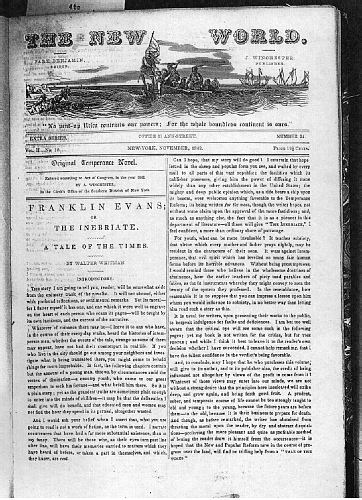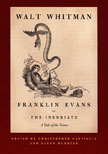Reading Franklin Evans seemed different at first. After reading Leaves of grass I guess it should. The way the book is written causes confusion at first because it’s not a poem. It’s a collection of short stories written in sequence to read like a story. The story about one man and everything that happens to him because of his need for alcohol.
What caught my attention at first was the fact that Walt Whitman started the story by not telling you Franklin Evans age. I suppose he did that to reach all age groups. If he would’ve mentioned an age, whoever wasn’t in that age group would probably think that his message wasn’t meant for them. Then Whitman begins every chapter with a poem, that actually tells you what that particular story is about. It seemed like he was baiting you, the reader to want to know more maybe. Once you read the poem, you actually ask yourself, “What does this have to do with this story?”. I found myself reading to figure out the significance.
The book was written to teach a lesson. Around the time Walt Whitman wrote Franklin Evans Brooklyn was going through major changes. Its’ people were in and out of work, not enough money, children to feed, issues on how to run Brooklyn, manage the large rush of people moving in, people did what they usually do when times are bad, THEY DRINK! Whitman not only saw it, he participated, which gave him a good insight on how how people behave once intoxicated. He saw first hand what it did to people and their families that he decided to write about it hoping to save some from self destruction and family destruction.
Whitman claimed he wrote the novel while intoxicated. He might have. Sometime you find yourself in a bad way, and need a way to let the pain out. Maybe this was a bad time for Whitman, I can not say for sure but he wrote this novel, he says, to teach intemperance. He might of wrote it for forgiveness also.

I found the paper that Franklin Evans was first published. I thought that everyone would like to see it. This novel was originally written in the paper, not as a book. If you haven’t read it, check it out. It’s interesting, seems different but to me sounds like Whitman. It’s risky writing with a twist.



Recent Comments